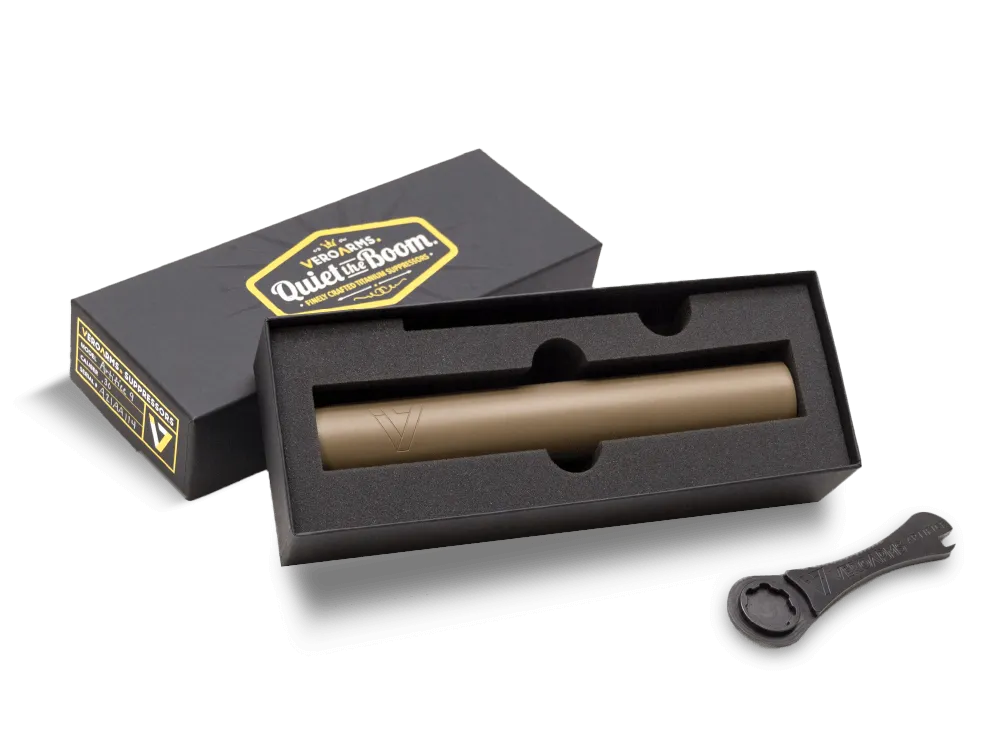Introduction
Suppressors, often known as silencers, have been an integral part of firearms technology for over a century. Titanium has emerged as a leading choice among the various materials used due to its superior strength, lightweight characteristics, and excellent heat resistance. The evolution of titanium suppressors is a testament to technological advancements to enhance performance, longevity, and user experience.
The Origins: Early Suppressor Designs
The first commercially available suppressor was patented by Hiram Percy Maxim in 1909. These initial designs primarily focused on muffling gunfire to reduce noise pollution. The early models were typically made from steel due to their availability and strength, but they were bulky and prone to rust, requiring frequent maintenance.
While titanium was known as a material, it wasn’t commonly used in suppressors initially. This was largely due to its cost, limited availability, and the challenges of working with it. However, as manufacturing techniques improved and the demand for lightweight, durable suppressors grew, titanium became an attractive option for firearm enthusiasts, hunters, and military personnel.
The Shift to Titanium: A Game-Changer
The shift towards using titanium in suppressor design began in earnest in the late 20th century. Engineers and designers recognized the material’s potential for revolutionizing suppressor performance. Titanium brought three key benefits:
- Weight Reduction: Titanium is about 40% lighter than steel, making it ideal for suppressors, where excess weight can affect a shooter’s accuracy and control.
- Strength and Durability: Despite its lightweight properties, titanium is incredibly strong, capable of withstanding high pressures and temperatures produced by modern firearms.
- Corrosion Resistance: Titanium’s natural resistance to corrosion reduces maintenance needs and extends the suppressor’s lifespan.
This transition wasn’t immediate, as manufacturing costs remained high. Early titanium suppressors were relatively expensive and therefore limited to high-end markets, such as military use and elite shooting competitions. However, as production techniques improved and the cost of titanium decreased, it became more accessible to civilian shooters.
Major Breakthroughs in Titanium Suppressor Design
1. Improved Manufacturing Techniques
One of the most significant breakthroughs in the evolution of titanium suppressors was the advent of improved machining and welding techniques. With advancements like CNC (Computer Numerical Control) machining, manufacturers could create more intricate and efficient baffle designs that better-controlled gas expansion and noise reduction. These designs also made better use of titanium’s unique properties, resulting in more effective and quieter suppressors.
2. Modular Suppressor Systems
The introduction of modular suppressors was another milestone. Modular systems allow users to customize the length, weight, and performance of their suppressor, enhancing versatility. Titanium’s lightweight nature makes it especially suited for modular systems, as it can maintain manageable weight even with added components.
3. Enhanced Heat Dissipation
Another key advancement in titanium suppressors is their ability to manage heat. Modern suppressor designs now incorporate more efficient heat-dissipation features, preventing the rapid heat buildup that was a challenge for earlier models. Titanium’s excellent heat resistance means it can withstand repeated firing sessions without degrading, making it more reliable for tactical and sustained-use scenarios.
4. Hybrid Materials and Coatings
In recent years, the evolution of titanium suppressors has also seen the incorporation of hybrid materials and specialized coatings. These innovations aim to enhance suppressor performance further by reducing friction, managing heat, and improving noise reduction. By combining titanium with other materials like Inconel or using ceramic coatings, manufacturers can offer suppressors that are not only more durable but also quieter and more efficient.
Modern Innovations: The Latest in Titanium Suppressor Technology
Today’s titanium suppressors represent the pinnacle of suppressor technology. They feature the following innovations:
- Advanced Baffle Designs: The baffle system, which plays a crucial role in noise reduction, has become more sophisticated. Modern titanium suppressors use computer-aided designs to optimize the baffle structure for maximum sound suppression while maintaining a compact form.
- Quick-Attach Systems: The latest models offer quick-attach systems that allow users to mount or remove suppressors rapidly. This innovation is particularly useful in tactical situations and for hunters who need to adapt quickly to changing conditions.
- Integrated Suppressor-Rifle Systems: Some manufacturers have introduced rifles with integrated titanium suppressors. These systems are designed to work seamlessly together, offering improved accuracy, reduced recoil, and better noise suppression.
- Customization Options: Modern suppressors often come with customizable components, allowing shooters to fine-tune their performance based on the specific firearm or shooting scenario. This customization is particularly popular among competitive shooters and professional marksmen.
Conclusion
The evolution of titanium suppressors has been marked by continuous innovation aimed at improving user experience, performance, and durability. From their early beginnings as heavy, steel-based designs to today’s lightweight, high-performance models, titanium suppressors have come a long way. With advancements in manufacturing, materials, and design, they have become a favorite among shooters seeking the best combination of sound suppression, reliability, and ease of use.
See also Emma Partnerships and Collabs Pauls Mith linked in
FAQs
Why is titanium preferred for suppressors?
Titanium is preferred due to its strength, lightweight properties, and excellent resistance to heat and corrosion, making it ideal for suppressor design.
Are titanium suppressors suitable for all firearms?
Yes, titanium suppressors are versatile and can be used with various calibers, though compatibility depends on the suppressor’s design and threading.
Do titanium suppressors require special maintenance?
While titanium suppressors are more resistant to corrosion, regular cleaning and inspection are recommended to ensure optimal performance and longevity.
How does titanium compare to steel in suppressors?
Titanium suppressors are lighter, more corrosion-resistant, and better at handling heat than steel suppressors, though they are typically more expensive.




